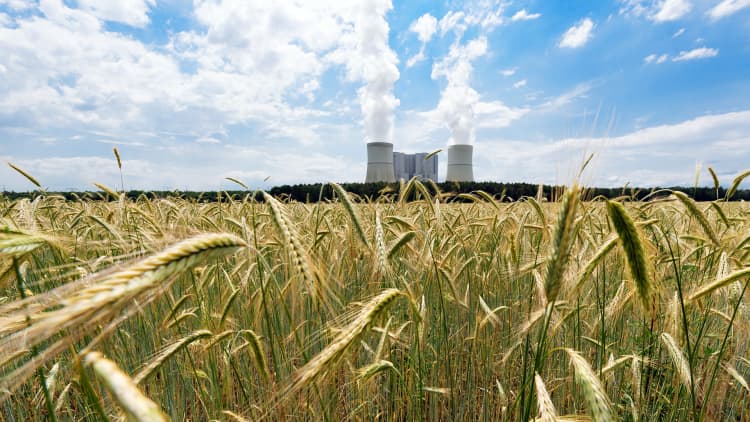Climate activists and campaign groups are pursuing an abrupt end to the fossil fuel era, condemning the latest round of net-zero pledges from many governments and corporations as a smokescreen that fails to meet the demands of the climate emergency.
Calls to keep fossil fuels in the ground are anathema to leaders in the oil and gas industry, who insist the world will continue "to be thirsty for all energy sources" in the years ahead.
To be sure, the burning of fossil fuels, such as coal, oil and gas, is the chief driver of the climate crisis and researchers have repeatedly stressed that the best weapon to tackle rising global temperatures is to cut greenhouse gas emissions as quickly as possible.
Yet, even as politicians and business leaders publicly acknowledge the necessity of transitioning to renewable alternatives, current policy trends show dirty fuels are not going away — or even declining — anytime soon.
Tom Goldtooth, a climate activist and executive director of the North American Indigenous Environmental Network, described the burning of fossil fuels as like filling a bathtub with far too much water. "It is overflowing with too much carbon. The world can't absorb any more."
"The simple solution, that we are still demanding, is the world has to turn the valve off," Goldtooth said. His comments came as he spoke at The People's Summit for Climate Justice, an event hosted by the COP26 Coalition on the sidelines of the Glasgow summit in November.
"The net-zero solution is not a solution," he said. "It is not going to get this world where we need to go, it is not going to get us to 1.5 degrees Celsius."
To have any chance of capping global heating to the goal of 1.5 degrees Celsius, the aspirational goal of the landmark 2015 Paris Agreement, the world needs to almost halve greenhouse gas emissions in the next 8 years and reach net-zero emissions by 2050.
That's a huge undertaking, and one that the world's leading climate scientists have warned will have to incur "rapid, far-reaching and unprecedented changes" across all aspects of society.
If you scratch the surface just a little bit of most of these net-zero targets, you find there is nothing of the radical systemic transformation we need.Teresa AndersonClimate policy coordinator at ActionAid International
The world has already warmed roughly 1.1 degrees Celsius above pre-industrial levels and the latest projections, despite numerous pledges at COP26 in early November, show global heating is on track for a rise of 2.4 degrees Celsius by the end of the century.
At COP26, the so-called Glasgow Climate Pact sought to build on the Paris Agreement and prevent the worst effects of the climate crisis, although it faced sharp criticism over plans to "phase down" coal, fossil fuel subsidies and financial support to low-income countries.
Big Oil's role in the energy transition
The U.S. Energy Information Administration said in its International Energy Outlook 2021 in early October that renewable energy sources will likely be the primary source of new electricity generation through to 2050, but fossil fuels such as natural gas and coal will continue to be used to help meet load and support grid reliability.
It comes at a time when the total amount of renewable energy that's available is growing, but not as quickly as the increase in global energy demand overall.
Fossil fuels accounted for more than 80% of global energy consumption in 2019, according to data compiled by Our World in Data, while renewables such as wind and solar accounted for 11.4%.

Nick Stansbury, head of climate solutions at Legal and General Investment Management, one of Europe's largest asset managers, said he believes oil and gas giants will have a "really important" role to play in the energy transition.
"We think, clearly, the outlook for oil and gas demand over the next 30 years is not going to look anywhere close to what it has looked like over the past 30. This industry no longer operates where demand just continues to go up relentlessly every single year barring financial crises or recessions," Stansbury told CNBC's "Street Signs Europe" earlier this month.
"But, even under the most aggressive transition scenarios, you do not see oil and gas demand disappearing overnight. Yes, the industry needs to invest less money, but oil and gas is still going to be consumed globally almost certainly in 30 years' time."
Stansbury said energy giants "are going to have a really, really important and very positive role to play, both for us as investors in providing us with lots and lots of juicy cashflows — we hope — but also for the world because we cannot simply turn the oil and gas industry off overnight and keep the world running."
OPEC, an influential producer group that produces around 40% of the world's crude oil, has said that the narrative that the energy transition is from fossil fuels to renewables is "misleading and potentially dangerous."
In remarks to assembled delegates at COP26 on Nov. 10, OPEC Secretary-General Mohammed Barkindo said a failure to listen to all voices on issues such as reducing emissions, energy affordability and security could lead to unintended consequences. These include market distortions, heightened volatility and energy shortfalls.
All of these examples are already evident today, however — and at a time when the global energy mix is still dominated by fossil fuels.
Scholars and ecological economists have labeled attempts to portray oil and gas giants as the answer to the energy transition as "fossil fuel solutionism." This term refers to the messaging that promotes ineffective solutions and draws attention away from more effective measures.
Earlier this year, the International Energy Agency published the world's first comprehensive roadmap to building a global energy sector with net-zero emissions by 2050.
The IEA said in May that there could be no new oil, gas or coal development if the world is to reach net-zero by the middle of the century. It added government pledges at that time fell "well short" of what would be necessary to reach net-zero.
'Offsetting is a huge scam'
Technologies such as carbon capture, utilization and storage and sequestration feature prominently in countries' climate plans as well as the net-zero strategies of some of the world's largest oil and gas companies.
Proponents of fossil fuels argue it is these carbon capture technologies that can allow countries and companies to keep burning fossil fuels.
This is rejected by climate researchers, campaigners and environmental advocacy groups, however, who argue these schemes provide cover for heavy polluting actors to continue with a business-as-usual approach.
"Offsetting is a huge scam, it is a massive problem," said Sara Shaw, international program coordinator for climate justice and energy at Friends of the Earth International, an environmental group.
"And alongside that, we have nature-based solutions, which sounds so appealing. We see it very much as a wolf in sheep's clothing. Sounds really nice but actually, it is another kind of repackaging of net-zero, of offsets, reducing emissions from deforestation and degradation by planting trees and creating carbon sinks. It is the same thing, but it has been made to sound very attractive."
"I think, in order to understand where nature-based solutions are coming from, look at who's promoting it," Shaw said. "It's oil companies and other big polluters and so that for me this is a real tell-tale sign that this is not what it seems."
Shaw said net-zero pledges from many governments and international companies were largely "tinkering around the edges" of the real problem. "They just need to stop burning fossil fuels. They need to come out of that business [and] they need to make that systemic transformation."
Teresa Anderson, climate policy coordinator at ActionAid International, a development charity, said: "All of these assumptions about net-zero are really relying on the assumptions that net-zero is necessary and sufficient for meeting the 1.5 target. And obviously it is neither."
"It is understandable that there could be some confusion because net-zero sounds like zero," Anderson said. "But actually, net-zero by 2050, which is most of these target announcements, all that really means is that in 2050, so 30 years hence, that government or corporation is going to be offsetting what they pollute that year. It says nothing to what they are doing for the next decade in order to stop polluting now."
"If you scratch the surface just a little bit of most of these net-zero targets, you find there is nothing of the radical systemic transformation we need," Anderson said.
She described net-zero goals as an "accounting trick" that legitimizes a business-as-usual approach, allows greenwashing and supports land grabs in the Global South.






